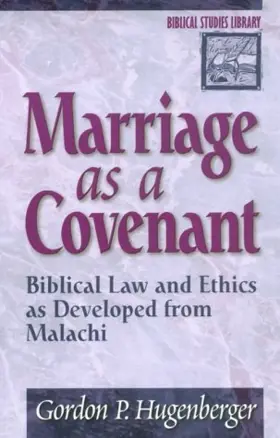

Marriage as a Covenant: Biblical Law and Ethics as Developed from Malachi
Pages
436 pages
Publisher
Baker Academic
Published
12/1/1998
ISBN-13
9780801021923
Reviews
A thorough Evangelical study of the divorce passage in 2: 10-16.
[Full Review]
The 1990s have seen a renewed interest in the Israelite family as a historical phenomenon. Perhaps this interest is part of a larger Western cultural trend that seeks to soothe nerves jangled by high divorce and illegitimacy rates, or perhaps it comes from scholars' reactions to fundamentalist misuses of the Bible to defend patriarchy (as the contributors to the excellent volume edited by Leo Perdue, Families in Ancient Israel [Louisville: Westminster/John Knox, 1997] explicitly claim). Whatever the external impetus, the contributions of works such as S. Bendor's Social Structure of Ancient Israel (Jerusalem: Sinor, 1996) and Karel van der Toorn's Family Religion in Babylonia, Syria and Israel (Leiden: Brill, 1996) are significant and enduring. In the current scholarly climate, Gordon Hugenberger's Marriage as a Covenant has a small, but respectable part. Eschewing the sweeping scope of the other works mentioned above, Hugenberger concentrates in this revision of his doctoral thesis on a short passage, Malachi 2:10-16, and particularly on the locution ^tyrb tva in verse 14. Is marriage a covenant? That question occupies the 343 pages of text in this volume. The author, who is the senior minister of the historic Park Street Church in Boston, concludes that the Israelites did conceive of marriage as a covenant, which he defines as a relationship between non-relatives that involves obligations and is established through an oath involving the deity (215). While arguing this case, for which direct evidence is admittedly only the enigmatic phrase in Malachi 2:14 and the extended metaphor in Ezekiel 16:8, he surveys dozens of subordinate issues, ranging from the date (mid-fifth century BCE, though Hugenberger's arguments only demonstrate a terminus a quo) and narrative shape of Malachi, the wording of marriage agreements in the ancient Near East, and the nature of covenants.
[Full Review]

